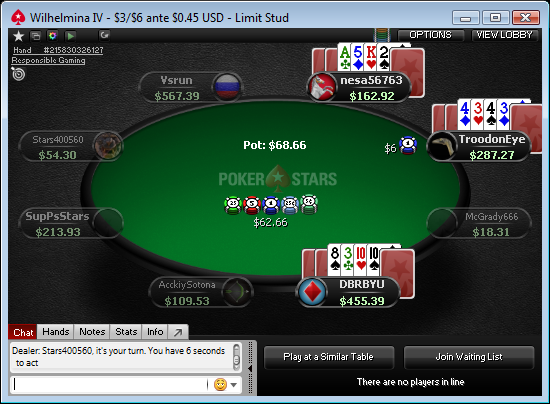Seven Card Stud
Seven Card Stud is a classic poker game which can take a lifetime to master. In Seven Card Stud, players are individually dealt seven cards throughout the course of the hand, but only the best five-card poker hand possible for each player is used to determine the winner. View the Poker Hand Rankings for Seven Card Stud.
Unlike Texas Hold’em and Omaha, Seven Card Stud is usually played with a Limit betting structure, in which the bets are in fixed increments. For example, in a $2/$4 limit game the bets are in increments of $2 on the first two betting rounds, and increments of $4 on the subsequent three betting rounds.

Rules for Seven Card Stud
Ante
Before a game of Seven Card Stud begins, all players ante a nominal amount (the exact amount depends on the game). This is the cost of being dealt into the hand. For example, the ante is $0.15 in a $1/$2 game.
Third Street
Each player is initially dealt three cards, two hidden hole cards and one face up. The player with the lowest exposed card is the ‘bring-in’, and is forced to start the action. They must make either another nominal bet (the exact size of the bring-in depends on the game) or, if they choose, a full bet of the lower betting increment. Action continues clockwise around the table until betting is complete for the round.
Fourth Street
Each player now receives another exposed card, called ‘Fourth Street’. The first player to act is the individual whose exposed cards have the highest poker value. For example, a player with an exposed pair of Kings would act first, if no other player is showing a pair of Aces or better. This player may either check or bet the lower structured betting amount (for example, $2 in a $2/$4 game). Please see the ‘Additional Stud Rules and Situations’ section below for an exception to this rule.
There is a round of betting.
Fifth Street
Each player now receives another exposed card, called ‘Fifth Street’. Again the first player to act is the individual whose exposed cards have the highest poker value. There is a round of betting.
Starting on Fifth Street and for the rest of the hand, all bets are in big bet increments ($4 in a $2/$4 game).
Sixth Street
Each player now receives another exposed card, called ‘Sixth Street’. Again, the first player to act is the individual whose exposed cards have the highest poker value. There is a round of betting.
Seventh Street (or the River)
Each player now receives a seventh and final card, which is dealt face-down and known only to the player to whom the card is dealt. The first player to act is the individual whose exposed cards have the highest poker value. There is a final betting round, and if more than one player remains, we reach the Showdown.
The Showdown
If there is more than one remaining player when the final betting round is complete, the last bettor or raiser shows his or her cards first. If there was no bet on the final round, the player in the earliest seat shows his or her cards first (Seat 1, then Seat 2, and so on). Further hands involved in the Showdown are exposed clockwise around the table.
The player with the best five-card poker hand wins the pot. In the event of identical poker hands, the pot will be equally divided between the players with the best hands.
After the pot is awarded, a new online game of Seven Card Stud poker is ready to be played.
Player Betting Options
In Stud, as with other forms of poker, the available actions are ‘fold’, ‘check’, ‘bet’, ‘call’ or ‘raise’. Exactly which options are available depends on the action taken by the previous players. If nobody has yet made a bet, then a player may either check (decline to bet, but keep their cards) or bet. If a player has bet, then subsequent players can fold, call or raise. To call is to match the amount the previous player has bet. To raise is to not only match the previous bet, but to also increase it. Bets and raises in Limit games are in pre-determined amounts.
Additional Stud Rules and Situations
For the purpose of determining the bring-in in Seven Card Stud, ties in card rank are broken by suit. The suits are ranked in alphabetical order – clubs (lowest), diamonds, hearts and spades (highest). The lowest suit breaks a tie, so if the deuce of hearts and deuce of clubs are visible at the beginning of the hand, then the deuce of clubs would have the bring-in. (Note: The ranking of equal hands at the Showdown is not determined by this rule.)
If the player with the lowest card showing on Third Street is all-in for the ante and they are consequently unable to make the required bring-in bet, the bring-in moves clockwise to the next player at the table, regardless of the value of that player’s exposed card.
On Fourth Street, if any player shows a pair, the betting can optionally be opened or raised for one big bet (for example, $4 in a $2/$4 game). Once someone makes the ‘big bet’ in this situation, the bigger bet amount continues for the remainder of the Fourth Street betting.
Because Stud games are played with eight players but there are only 52 cards in the deck, it’s possible to run out of cards before Seventh Street can be dealt. In this very rare instance, a single ‘community card’ will be dealt face-up on the table, which will be shared by all remaining players.
Other Stud Variants
There are other variants of Seven Card Stud, called Seven Card Stud Hi/Lo (aka ‘Stud Eight or Better’ or ‘Stud/8’) and Razz. In Seven Card Stud Hi/Lo, there are two potential winners in each hand, one person for holding the best high hand and one person for holding the best low hand, provided the low hand is an eight-low or better. In Razz, the entire pot is awarded to the best low hand, with no qualifier.
Learn How to Play Seven Card Stud for Free
If you’ve never played Seven Card Stud before, we welcome you to give it a shot on one of the free poker tables at our recommended poker rooms. You can download the software for free and create a play money account to practice.



